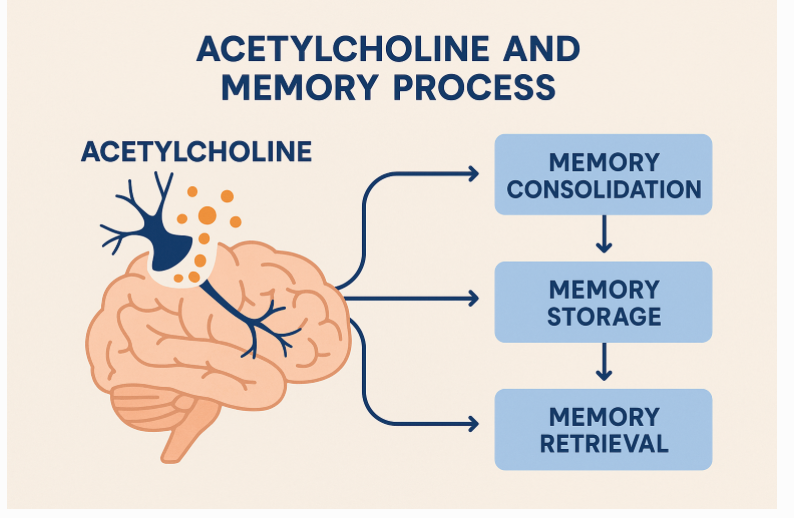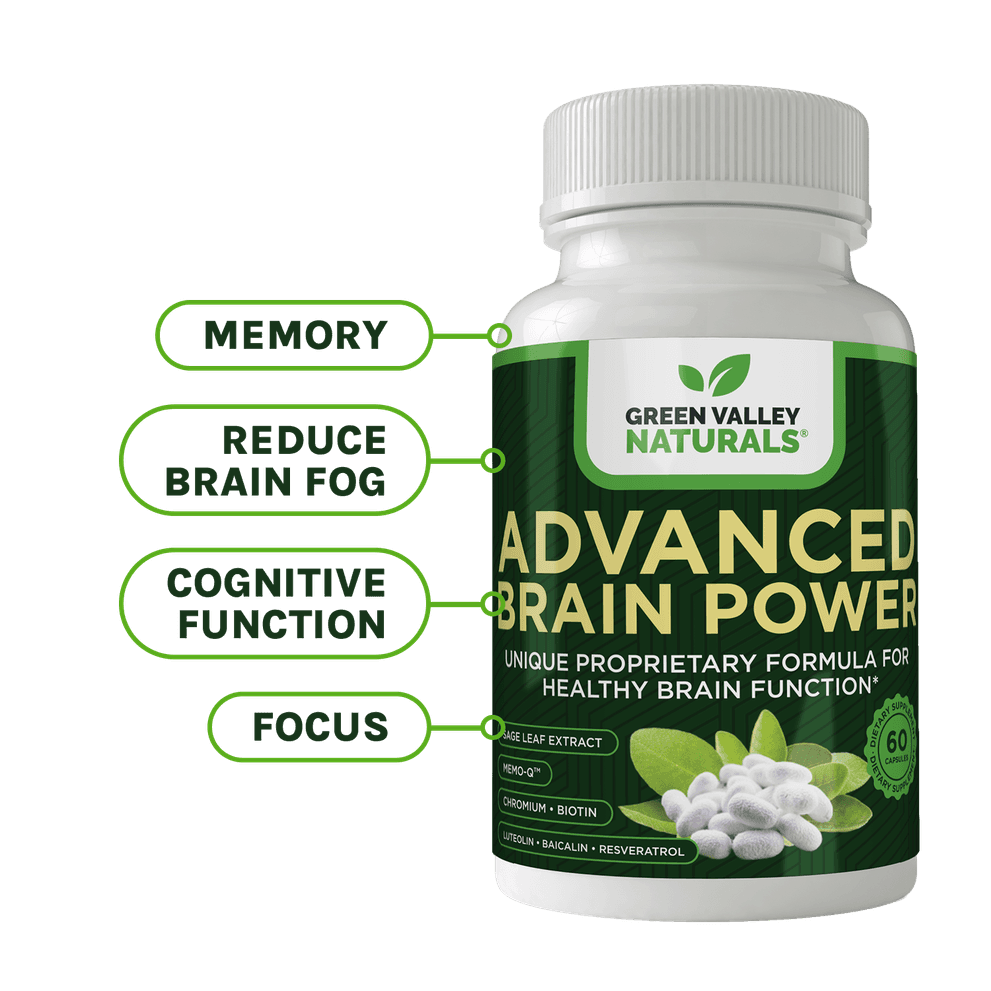
What if the answer to memory loss, brain fog, and even menopause symptoms was sitting quietly in your spice rack? Meet sage—the ancient “salvation plant” now earning modern acclaim as a potent cognitive enhancer. More than just a flavorful herb, sage may sharpen your mind, calm your nerves, and even help balance your hormones. Researchers are discovering that sage capsules can deliver brain benefits within hours—and that’s just the beginning. Whether you’re seeking clearer thinking, better memory, or natural stress relief, this unassuming herb may hold the key.
Key Takeaways
Sage boosts memory and cognition by preserving acetylcholine, a neurotransmitter crucial for attention, learning, and recall.
Clinical studies support sage’s fast-acting benefits—with noticeable improvements in mental clarity, memory, and alertness in as little as one dose.
Sage also supports hormonal balance, stress relief, digestion, and immunity, making it a multi-functional herb for women and older adults.
Sage: More Than A Spice
Sage is a potent nootropic that can help keep your brain "young" even as you age. It is an herb that's been dubbed the "salvation plant," and a commonly used spice used in many cuisines around the world. Sage is the largest member of the mint family, which includes other popular herbs such as oregano, rosemary, basil, and thyme. Sage has a strong aroma and earthy flavor, which is why it's generally used in small quantities.
The two most common species of sage are common sage, also called garden sage (Salvia officinalis), and Spanish sage (Salvia lavandulaefolia). Common sage is most commonly used to make sage extract and sage capsules as dietary supplements.
This green herb comes as a fresh or dried spice, in oil form, as an extract, and as an essential oil. It has numerous health benefits due to its beneficial compounds, along with some caveats, which we'll detail below.
Sage capsules support immune function, digestive wellness, cognitive wellness, and menopausal health, among other things. Sage capsules and sage plants offer numerous health benefits, including:
Promoting balanced cholesterol
Strengthening memory
Fighting inflammation
Blocking free radicals with powerful antioxidant properties
Defending against microbes and germs (antimicrobial)
Supporting easy digestion
Promoting healthy cellular reproduction
Helping reduce menopausal hot flashes, excessive sweating, and other menopause symptoms
Sage is available in several forms — as whole-plant capsules, leaf-only capsules, sage leaf extract, sage essential oil, and of course, in herbal form. Let's take a closer look at how you can take advantage of all of the health benefits sage has to offer.
How Sage Affects Memory and Cognitive Function
Sage Salvia plants are noted for their antioxidant effects and ability to enhance “head and brain” function, boost memory, quicken the senses and delay age-associated cognitive decline. If you want to keep your brain sharp into old age, sage is worthy of your consideration.
Several clinical studies—particularly in older adults with mild to moderate memory loss—have shown that standardized sage extracts improve working memory, attention span, and overall cognitive performance.
Some trials even suggest that a single dose of sage extract or essential oil can produce acute enhancements in memory and alertness in healthy adults. Perhaps most exciting, results happen fast, within hours of ingestion. Sage leaf can help to:
Restore memory loss and delays cognitive aging
Provide support brain health, boost memory, and enhance cognitive function in healthy adults
Deliver results backed by human enzyme and memory performance studies
How does it work?

Acetylcholine’s Role in Memory
Acetylcholine is a key neurotransmitter that's heavily involved in memory, learning, attention, and other cognitive functions. It plays a central role in how brain cells communicate, especially in memory-critical areas such as the hippocampus.
Acetylcholine acts as a chemical messenger between neurons. Here's how the process works in simple terms...
Imagine two boats (neurons) are floating on a river. They can’t touch, but they want to send messages to each other. One boat, the presynaptic neuron, creates a message, puts it in an acetylcholine bottle, and tosses it across the water (i.e., the synaptic gap). The other boat (the postsynaptic neuron) catches the bottle using a special net of acetylcholine receptors, reads the message, and responds.
This is how your brain sends memory and attention signals, only at lightning speed.
How It Works in 6 Simple Steps
Neuron A gets excited and prepares a message to send via acetylcholine.
It packages ACh into little bubbles called vesicles and thrusts them across the gap.
Neuron B catches the ACh with the special receptors on its surface.
The message helps Neuron B store or recall a memory.
Once the message is read, an enzyme called acetylcholinesterase mops up the extra bottles, so the next message that follows isn't confused with previous ones. This in essence, stops the signal, ensuring precise control over brain function.
But if the cleanup crew gets too aggressive, acetylcholine levels will drop, impairing memory and learning. Balance is everything.
Understanding Acetylcholinesterase Inhibition
Research shows that sage leaf contains compounds such as rosmarinic acid, carnosic acid, and essential oils with antioxidant, anti-inflammatory, and cholinesterase-inhibiting properties. These mechanisms may help increase levels of acetylcholine (ACh), a neurotransmitter critical for memory, learning, and attention.
A clinical trial showed that sage extract boosted ACh levels by 54% by blocking the breakdown enzyme. (Scholey et al., 2008).
Taking sage may help manage chemical imbalances in brain function that are linked to cognitive decline.
Here are some other studies about the health benefits of sage that are worth noting:
Scientists have identified sage extract that increases memory performance in older adults by nearly 60% and improves measures of attention 2.5-fold—all within hours of ingestion, which is remarkable. What's more, it extended lifespan by 12% in animal models of aging.
Studies confirm that taking a single dose of common sage or Spanish sage orally improves memory, alertness, and attention in healthy adults. However, sage aromatherapy with sage essential oils only improves alertness, not attention and memory.
A 2014 systematic review found Salvia officinalis and Salvia lavandulaefolia help enhance memory and boost cognitive function in both healthy adults and in those with dementia or cognitive impairment. But due to the use of various herbal supplement preparations (essential oil, extracts, use of raw material) instead of a uniform preparation, the study results were inconclusive.
Sage may also boost the activity of other neurotransmitters including GABA and glutamate, and boost blood flow to the brain, which supports brain health.
Other Health Benefits of Sage
Sage is known for a wide range of health benefits besides brain function.
Antioxidants Protect from Cellular Damage
Sage extract has potent antioxidants which can help protect from cellular damage and support optimal cellular reproduction, which helps protect them from becoming cancer cells.
Helps Women Manage Menstruation, Menopause
For years, women have used sage to address painful menstrual periods. Sage has also been used to reduce menopausal hot flashes and excessive sweating — common causes of sleep disorders associated with menopause and other symptoms in postmenopausal women.
Clinical trials have shown that sage can significantly reduce the frequency and intensity of hot flashes—sometimes by over 60–70% in just a few weeks.
Other developing research suggests that a combination of common sage and alfalfa extract over a three-month period reduces hot flashes and night sweats.
Supports Lower Blood Sugar Levels
What's more, sage extract and sage capsules may help to reduce blood sugar levels and improve digestive health, making them a useful supplement for individuals with blood sugar concerns.
Laboratory studies show that sage can activate a specific receptor in Type-1 diabetes. Activation of this receptor clears excess free fatty acids in the blood, which helps improve insulin sensitivity. More research is needed, but one meta-analysis of three trials found that sage helped to significantly lower fasting blood sugar and HbA1c.
Promotes Balanced Cholesterol
Taking Salvia officinalis extract three times a day for two months reduced high LDL cholesterol and blood fats called triglycerides, while increasing "good" high-density lipoprotein (HDL) cholesterol. However, not all studies have shown similar results.
Relieves Stress and Improves Mood
Sage extract may also offer mood support and reduce stress, which helps promote overall wellbeing and sleep quality.
Immune and Digestive Aid
Salvia officinalis has several compounds that support immune health through antimicrobial, anti-inflammatory, and antioxidant actions. It’s not a frontline immune booster like elderberry or echinacea, but sage still offers decent complementary support.
Sage contains proven antibacterial, antiviral, and antifungal effects. It also contains compounds like rosmarinic acid and carnosic acid that help modulate immune response and reduce inflammatory cytokines, which helps support immune balance.
Anti-inflammatory and Antioxidant Benefits
Studies have found that salvia officinalis offers both anti-inflammatory and antibacterial effects. Sage also contains more than 160 distinct polyphenols, plant-based chemical compounds that fight free radicals in your body.
Sage also has a good safety profile.
Using Sage For Overall Health
So, how to get started? You can trim sage leaves from your herbal garden and make it into tea. Fresh sage leaves have a strong flavor, so a little goes a long way.
You can also add sage these ways:
Chop up and use as a garnish on soups, salads, casseroles, or eggs.
Use ground sage in stuffing for roasted meats or veggies.
Combine fresh sage with butter and garlic to make sage butter.
Add chopped sage to tomato sauce.
Sage Tea
Sage tea is simple, just pour hot water over the leaves, let it steep a few minutes, and enjoy! With sage tea, you get food-based benefits from the herb, similarly to using it as a fresh or dried herb. It's much harder to overdose on a fresh herb. 😊
With a diffuser you can get relaxing aromatherapy benefits via the limbic system.
Finally, sage capsules compared to the fresh herb, give you targeted and often standardized support with moderate to high potencies.
Sage Capsules
Sage capsules boast potent antioxidant properties, which can help reduce cellular damage and inflammation. They can also be used to support brain and memory, menopause symptoms, immune function, digestive wellness, and more.
Sage extracts can be a concentrated liquid or dried extract, often using alcohol, water, or glycerin to pull out the most active compounds. They're typically standardized to a certain active ingredient, such as rosmarinic acid, and used as targeted relief for menopause, memory, or inflammation.
Sage leaf extract is made from the leaf only (as opposed to the whole plant). It's often standardized to the strength used in research studies, for example, for menopause or cognition. Green Valley Natural's sage leaf extract formula called Advanced Brain Power is an 8:1 extract, known for its memory-enhancing properties.
Advanced Brain Power targets five major “Memory Thieves” that trigger cognitive decline: low acetylcholine (ACh), poor blood sugar control, inflammation, low oxygen to the brain, and toxin accumulation. It works by combining seven research-backed ingredients including sage supplement (Salvia officinalis) to boost your brain and support a healthy, active memory.
Sage Essential Oil
Sage essential oil is extracted from Salvia officinalis, and boasts anti-inflammatory benefits and digestive health benefits. Sage oil can be used topically for inflammation and skin health, but it should always be diluted for topical use.
A primary use of sage essential oil is for aromatherapy, to promote relaxation and reduce stress.
VERY IMPORTANT NOTE: Sage essential oil, especially that of common sage, contains thujone. Thujone can be neurotoxic at high doses, and is also linked to seizures. It should NEVER be ingested without close medical supervision.
Choosing the Best Sage Capsules
Choosing the best sage supplement requires a couple insights. Look for products made from high-quality, organic sage leaf extract, like Green Valley Naturals Advanced Brain Power formula, which is free from fillers and artificial ingredients. When possible, choose a standardized extract for reliable results, from a company that has third party labs test for purity and potency.
Also, consider a vegetarian capsule made from vegetable cellulose, which is suitable for vegans and other people with dietary restrictions.
Dosage and Interactions
A little sage extract goes a long way. The recommended dose of sage supplement varies, but a typical dose is no more than 600 mg per day, although some studies have used higher levels. Take with food to minimize side effects, and don't exceed the product label's recommended dose.
Sage is generally considered safe, but there are some caveats, particularly if you take certain types of medications. (See below for details.)
Women who are pregnant or breastfeeding should not take sage capsules, and neither should children. Those with seizure disorders should avoid taking high doses of sage due to an increased risk of seizures.
Side Effects and Precautions
Sage may dramatically lower blood sugar levels in people with diabetes. Monitor your blood sugar closely if you have diabetes and use sage, especially if you're also on diabetes medications. Those medications may need to be adjusted.
Consult your healthcare professional before taking sage during pregnancy or breastfeeding. Sage may reduce milk production.
People who take medications should consult a healthcare professional prior to starting sage.
Summary
Sage, a widely used culinary herb, is gaining recognition as a powerful nootropic with benefits that range from enhanced memory and focus to menopause symptom relief and blood sugar regulation. Sage contains compounds like rosmarinic acid and carnosic acid that protect brain cells, support acetylcholine levels, and reduce inflammation. Clinical studies show that standardized sage extracts can improve memory and attention within hours of use. Sage capsules are available in various forms, with some offering targeted benefits for cognition, hormonal balance, and immune support—making them a valuable addition to a healthy, aging brain and body.
Frequently Asked Questions
What is the recommended dose of sage capsules, and how should they be taken?
A typical dose of sage capsules is no more than 600 mg per day. If a formula offers a standardized extract of sage, a little can go a long way and yield more reliable results. For example, the amount of sage in Advanced Brain Power is 167 mg.
Can sage capsules be used to support cognitive function and improve memory?
Yes, sage capsules can support cognitive function and improve memory, in both younger and older adults, including those experiencing age-related memory decline. These benefits are backed by both traditional use and modern clinical studies.
Are sage capsules safe for individuals with certain medical conditions, such as diabetes or high blood pressure?
Sage capsules are generally considered safe for most people when used in moderate, recommended doses. But people with certain medical conditions — such as diabetes or high blood pressure — should use them with caution, and always consult a healthcare provider first. You may need to monitor your blood sugar or blood pressure more closely due to sage's effects on those health metrics. This advice also applies to anyone with a seizure disorder.
You can mitigate some of these concerns by using a standardized sage supplement and taking it with food.
Is sage good for menopause?
Sage offers a popular safe, natural, and effective herbal support for many common menopause symptoms—especially hot flashes and night sweats that disrupt sleep, and mild cognitive/mood shifts, particularly when used in standardized extract form.
What side effects does sage extract have?
Sage capsules compared to sage food sources, can interact with medications, so you should check with your physician before taking it to make sure it doesn't interact with anything you take. Sage can also affect blood sugar levels and blood pressure, so monitor those issues more closely while taking a sage supplement.
1 https://www.rxlist.com/supplements/sage.htm
2 https://www.healthline.com/nutrition/sage#TOC_TITLE_HDR_12
3 Journal of Primary Healthcare. https://www.publish.csiro.au/HC/fulltext/HC19570
4 Wilfried D, Nina CDG, Silvia B. Effectiveness of Menosan® Salvia officinalis in the treatment of a wide spectrum of menopausal complaints. A double-blind, randomized, placebo-controlled, clinical trial. Heliyon. 2021 Feb 10;7(2):e05910. doi: 10.1016/j.heliyon.2021.e05910. PMID: 33615001; PMCID: PMC7881233. https://pubmed.ncbi.nlm.nih.gov/33615001/
5 Protect Brain Function with Sage Extract, Life Extension Magazine. https://www.lifeextension.com/magazine/2019/12/protect-brain-function-with-sage-extract?srsltid=AfmBOooWJmVzHDZxU_ILqr-9sOW7eoxn9pIRI0PTi2UyGgcedCyqrT10
6 Lopresti AL. Salvia (Sage): A Review of its Potential Cognitive-Enhancing and Protective Effects. Drugs R D. 2017 Mar;17(1):53-64. https://pubmed.ncbi.nlm.nih.gov/27888449/
7 https://www.supplysidesj.com/cognitive-health/healthy-aging-cognitive-function-and-sage



